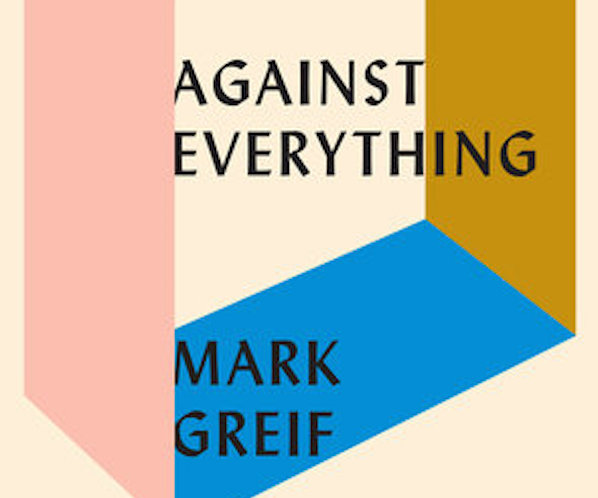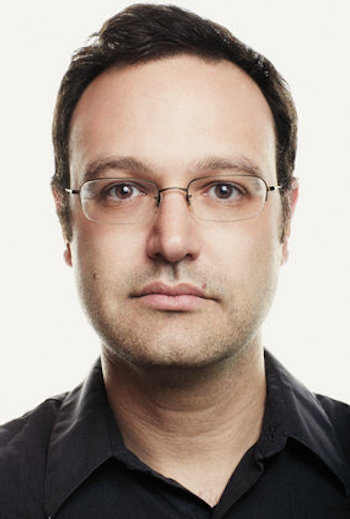Book Review: Mark Greif’s “Against Everything” — But For Nothing?
Mark Greif’s analyses can be sharply counter-intuitive, but once we absorb the meaning of his criticism there’s less to go forward with than we expect.
Against Everything by Mark Greif. Penguin Random House, 328 pages, 28.95.

By Matt Hanson
In his introduction to Against Everything, n+1 magazine co-founder Mark Greif’s new collection of essays, Grief clarifies what its bold title really means: “To wish to be against everything is to want the world to be bigger than all of it, disposed to dissolve rules and compromises in a gallon or a drop, while an ocean of possibility rolls around us.”
In Against Everything, Greif takes some of our current trends (hipsters, foodie culture), popular entertainments (reality TV, YouTube, Radiohead, rap and punk rock) and social issues (the semiotics of police, the financial crisis, Occupy) seriously enough to criticize them as thoroughly as any of the so-called highbrow arts. Greif explains that he isn’t trying to cast judgment from the lofty heights of the ivory tower: “this is not a book of critique of things I don’t do. It’s a book of critique of things I do. Habits in which I am joined by a class of people, call them the middle classes, or people in the rich nations, or Americans and Europeans the world over. I want to talk about you.”
This is both the strength and the weakness of Grief’s critique; in its earnest effort to be universally applicable, incisive insights and useful arguments lead up to gauzy conclusions that only gesture towards the kinds of changes encouraged by his arguments. Greif’s analyses can be sharply counter-intuitive, but once we absorb the meaning of his criticism there’s less to go forward with than we expect.
His deconstruction of reality TV, particularly Keeping Up With the Kardashians, shows the vapidity and sterility of the family as portrayed on the popular reality series. There’s nothing very interesting about the Kardashians (“a family born under the sign of plastic surgery”), which is part of their soporific appeal.The family seems interchangeable, a carousel of branding and conspicuous lassitude, not only because all their first names begin with the letter K.
All except for one, of course: the stepfather Bruce Jenner, the former Olympic athlete who was the running gag of the women-dominated family until he changed genders, became Caitlin (barely missing assimilation by the ubiquitous letter K), and became the most famous of the bunch, which Greif reads as “either the ultimate self-assertion of the vanished patriarchal order, of achievement, contest, whiteness, maleness — the long-ago real Olympian proving he can do what it takes to stay on top even to the point of becoming female — or it is patriarchy’s ultimate abdication.”
Greif is also a very incisive decoder of the semiotics of the police. Law enforcement has always been a contentious subject, given that police are often at odds with at least some aspect of society. But is this by design? Delving deeper into the meaning of police as they relate to law enforcement, Greif illuminates an important paradox about their social role: “it is always hard to remind or convince police that their stated loyalty is to the Constitution … a bad consequence is that it’s quite difficult to make police feel responsible for civil-rights violations or unjust laws, since rights and the law of the polity are not theirs to know or decide.”
Citing a police reformer’s conversation with the Oakland PD, Greif illuminates the gulf many police have over what their job really means: is it about catching crooks, as many in the force understand it, or is it a more complex task, to uphold the law and the Constitution? The question is especially relevant now, given the disturbing nationwide wave of shootings of African-Americans and the clearly urgent need for comprehensive police reform.
For an extremely popular and well-respected “rock” group, Radiohead have always stood at a critical angle to the utopian bliss offered by pop music. Radiohead has made anthemic music for the alienated among us, creating an often eerie and obscure soundscape. Greif’s analysis of Radiohead’s hermetic take on pop music leads him a provocative consideration of the value of privacy, emotional and intellectual, in an overwhelming media environment. For him, Radiohead’s enigmatic quality affirms the individual will to reject conventional society and its politics.
Public Enemy’s Chuck D once asserted that “most of my heroes don’t appear on no stamp.” As a good liberal, Greif wants to express solidarity but sees the ironies there, and is very good on the awkward political relationship between his love of hip-hop and his whiteness. He describes his self-conscious attempts to learn to rap and the extremely sensitive position this puts him in, socially speaking. What could have been a tritely humorous essay about another geeky white boy trying to emulate hip-hop culture becomes an interesting tour through the cultural matrix, and an anguished exploration of the embedded meanings related to dress, language, public presentation, and Otherness.
But not all the essays in Against Everything are as analytically rich. In “Against Exercise” Greif deconstructs gym culture and its heavy-handed emphasis on bodily perfection, arguing that the way our culture fetishizes the body re-entrenches the obsession with it’s ideal image and flaunts the endless public preening of dutiful maintenance. The argument is less appealing to me than it was when I first read it in N+1’s inaugural issue about ten years ago. I’m older now, and a lot less sarcastic about the value of working out for its own sake, regardless of its Sisyphean repetition and absurdity.

Essayist and Editor Mark Greif. Photo: Roderick Aichinger.
The same goes for Greif’s attitude towards foodie culture. After painstakingly debunking the status symbol of exotic food obsession, especially for upper middle class Westerners, Grief shrugs the meaning of his critique away by meekly asserting that “we have no language but health … health is our model of all things invisible and unfelt.” Fair enough, but there’s also an icky anecdote about a friend who, whenever he is about to eat something fatty “especially meat fats or hydrogenated oils, he imagines the interior arteries of his heart becoming clogged with a yellow-white substance, like margarine or petroleum jelly.” Thanks for sharing? It’s hard not to literalize the problems posed by the healthy food craze, but detailing other people’s food fears in uselessly literal language is not exactly furthering the discourse.
His analysis of other topics comes to the brink of a payoff and then inexplicably falls away. The sexualizing of young people, given that consumer society’s acceptable age limit for nymphets is lowering every year, is a problem that deserves our attention. There’s a constant media drumbeat encouraging young people to see themselves as sexual beings early and to view this as a form of cultural liberation — to be seen, and to be desired, is to find personal authentic personal empowerment.
After diagnosing the problem in the Best American Essay nominated piece “Afternoon of the Sex Children” he concludes: “the only hope would be, wherever possible, to deny ourselves in our fatuousness and build a barricade, penning us inside, quarantining this epoch that we must learn to name and disparage.” I’m not entirely sure how what Greif proposes could even happen, let alone what it would mean even if it did.
I’m equally fuzzy on what conclusion should be drawn about the social usefulness of YouTube. The opportunity to have a kind of egalitarian public space, filled with the kinds of self-expression ordinary people find interesting and the possibility for a free and open exchange of world culture is wonderful. But, predictably, it’s quickly become corporatized, saturated with ads, and the copyrights on various material often limits one’s exposure. Again, true, but I don’t think this is terribly new. “YouTube keeps giving us one piece of news that, though never novel, does stay news: what They think of us, and how we should feel about Them.” Which is how, exactly?
Throughout the book, Greif admires the great nonconformist thinkers such as Flaubert, the stoic Epicurus, and especially Henry David Thoreau. Of course, it’s unfair to diminish Greif by putting him in the shadow of these giants. But it’s worth noting that each of these proud nonconformists rejected the status quo with an equally passionate belief in the value of something held apart from the common stock. For Flaubert the creative writer, it was a crystalline prose style; for Epicurus the stoic philosopher, it was the discipline of self-mastery; the rebellious Thoreau made civil disobedience his moral and political line in the sand. Against Everything is filled with articulate, informed critiques of much that is mediocre and banal in the postmodern world, but comes up short in suggesting what kinds of thinking (or actions) might be needed to replace them.
Matt Hanson is a critic for The Arts Fuse living outside Boston. His writing has appeared in The Millions, 3QuarksDaily, and Flak Magazine (RIP), where he was a staff writer. He blogs about movies and culture for LoveMoneyClothes. His poetry chapbook was published by Rhinologic Press.
